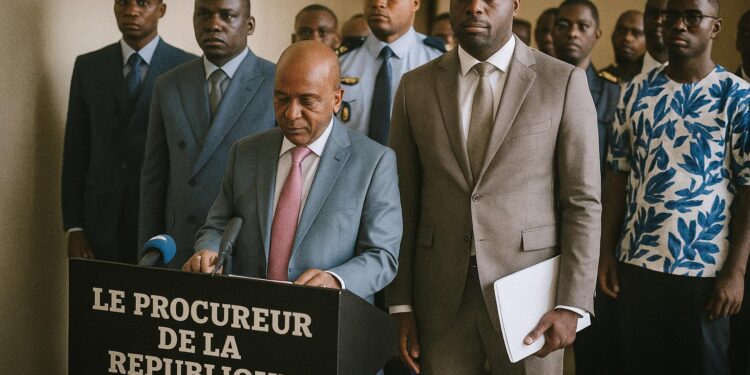A Discreet Security Sweep
The dawn transfer of lawyer Bob Kaben Massouka and six co-accused from the Central Intelligence and Documentation headquarters to the Brazzaville remand centre capped a fortnight of intense but low-profile investigative activity. Prosecutor André Gakala-Oko confirmed that the operation unfolded under the legal rubric of flagrant délits, permitting immediate detention in matters deemed to threaten national stability (Official communiqué, 22 July 2023).
Diplomatic observers stationed in the Congolese capital note that such swift procedural sequencing is emblematic of Brazzaville’s post-2016 security posture, which privileges early disruption over prolonged surveillance. A senior Western envoy, requesting anonymity, characterised the sweep as “rapid, coordinated and plainly designed to pre-empt any street-level momentum.”
Examining the Alleged Plot
According to prosecutorial filings, the defendants were linked through encrypted exchanges to an initiative labelled “Call for Mobilisation to Liberate Congo, 10 July 2025”, disseminated on a Facebook page administered abroad. Investigators contend that the group, composed of five Congolese nationals and two Central African ex-combatants, assigned one another roles ranging from logistics to communication. Recovered devices reportedly include Thuraya satellite phones, foreign SIM cards and military-grade talk-backs—items the security services present as corroborative of insurgent intent.
Independent analysts, including the Central Africa desk of the International Crisis Group, caution that open-source documentation of the page is limited, making the defendants’ digital footprint difficult to verify externally. Yet several experts on regional armed networks highlight that movements of light weaponry across the Ubangi River have intensified since early 2023 (ICG briefing, May 2023). Against this backdrop, Brazzaville’s concern over cross-border mercenary participation appears grounded in recent empirical patterns.
Legal Framework and Due Process
The prosecution cites Articles 265–267 of the Congolese Penal Code—provisions addressing criminal association and attempts against state security. Because investigators invoke flagrancy, the customary safeguard that requires the bâtonnier’s approval before detaining an attorney does not apply. The Congolese Bar Association has nonetheless requested “transparent access” to the case file, affirming in a press release its commitment to the rule of law while recognising the state’s obligation to maintain order.
Justice Ministry officials stress that the accused will benefit from the presence of counsel and the right to file for provisional release once the investigative phase concludes. A former magistrate interviewed by Jeune Afrique argues that the judiciary, mindful of international scrutiny, will aim to exhibit procedural orthodoxy: “When security and legality intersect, Brazzaville generally prefers the court docket to the court of opinion.”
Regional Reverberations
The alleged involvement of two ex-Seleka combatants foregrounds the porous nature of the Congo-Central African Republic frontier. Bangui’s Defence Ministry, contacted by Radio Ndeke Luka, reaffirmed its “full cooperation” with Brazzaville on extradition matters. Meanwhile, United Nations peacekeeping officials stationed in the CAR acknowledge heightened monitoring of transboundary axes traditionally exploited for illicit trade in small arms.
For Congo-Brazzaville, maintaining a perception of robust internal security bolsters its diplomatic outreach, notably within the Economic Community of Central African States. Regional envoys recall that President Denis Sassou Nguesso, currently one of the bloc’s senior figures, has repeatedly underscored collective security as a prerequisite for economic diversification. Neutralising putative subversive cells, therefore, aligns with both national imperatives and multilateral commitments.
Navigating Domestic Stability
Public reaction inside Brazzaville has so far been measured. Civil-society platforms, including the Cercle pour la Paix, urge balanced reporting and caution against social-media speculation. In neighbourhood cafés along Avenue de la Paix, conversations oscillate between scepticism over the defendants’ capacity to mount a serious challenge and recognition of the state’s responsibility to anticipate risk.
Should the investigation proceed to trial, analysts anticipate that the courtroom will become a microcosm of broader debates on political expression and security consolidation. Yet few expect a disruptive outcome. As one Congolese political scientist at Marien-Ngouabi University observes, “The state apparatus is experienced in converting security crises into demonstrations of institutional continuity.” In that sense, the Massouka affair may ultimately reinforce, rather than unsettle, the prevailing equilibrium.











































